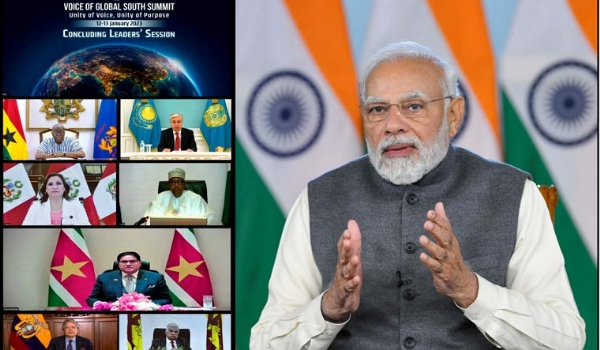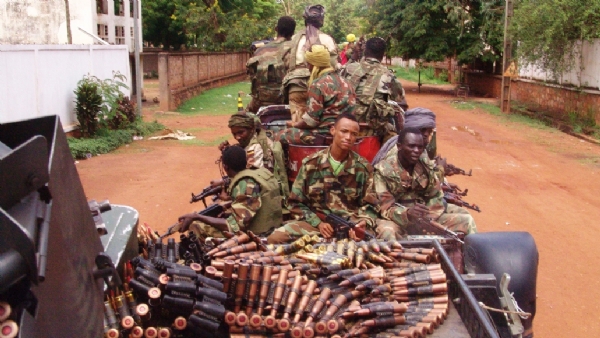Uniting for Progress: Navigating Geo-Political and Security Challenges in the Global South
I was tasked to speak on Geo political,defence and security challenges facing the Global South countries. Research paper presented by me in this seminar is given in the succeeding paragraphs.
Total Views |
National seminar on C20 -India 2023 Vasudev kutumbakkam that is (world is one family) was held on 8 April 2023, at Imphal, capital of Manipur state. The subjects covered in the seminar were Dharma, Education, Ecology and Geopolitics, Security and Defence.

I was tasked to speak on Geo political,defence and security challenges facing the Global South countries. Research paper presented by me in this seminar is given in the succeeding paragraphs.
As the world confronts the threat of global stagflation, India is among the few countries that have the potential to emerge as a winner in this situation. There are several challenges related to geopolitics, security, and technology that need to be addressed. If India can help the Global South find a way forward, then the prediction that "this century belongs to Asia, and this year 2023 belongs to India" may well come true.
The following paragraphs discuss these challenges in detail and provide practical solutions for addressing them.
- Security Challenges Faced By Countries Of South And Central America
- Security Challenges Faced By Island Nations Of Indo Pacific/Oceania
- Security Challenges Faced By African Countries.
- Action Plan & Summary of Recommendations
- Security Challenges Faced By Countries Of South And Central America
The South and Central American countries encounter various security challenges, including:
Political instability: Weak institutions, corruption, and authoritarian regimes often result in human rights violations, political violence, and lack of accountability.
Transnational organized crime: These nations frequently serve as transit points for drug trafficking, human trafficking, and other illegal activities, which can erode democratic institutions, rule of law, and social stability. Gang violence can also lead to high levels of violence, corruption, and intimidation.
Drug trafficking: Latin American countries are major producers and exporters of illicit drugs like cocaine, heroin, and marijuana. Well-funded and well-armed drug trafficking organizations wield significant influence and can perpetuate issues such as corruption, violence, and insecurity.
Terrorism: While the threat of terrorism in the region is relatively low, smaller countries could be targeted by terrorist groups seeking to establish a presence or carry out attacks.
Cyber security: Smaller countries in the region may have weaker cybersecurity infrastructure, making them more susceptible to cyber attacks.
Border security: Smaller countries in the region may have porous borders, leaving them vulnerable to cross-border crime, smuggling, and trafficking.
Recommended Countermeasures
To mitigate security challenges, Latin American countries can adopt a multi-pronged strategy, including:
Enhancing law enforcement and intelligence capabilities: To tackle drug trafficking, organized crime, and gang violence, countries can augment their law enforcement and intelligence capabilities.
Combating corruption: Corruption undermines security efforts. Governments can promote transparency, strengthen institutions, and ensure accountability for leaders and government officials.
Promoting regional cooperation: Countries can collaborate regionally to bolster security, such as through intelligence sharing, joint operations, and border security.
Investing in social programs: Smaller countries can invest in social programs that reduce poverty, inequality, and social exclusion. These programs can diminish the appeal of criminal and extremist groups and provide alternatives to joining gangs.
Improving border security: Countries can strengthen their border security infrastructure to reduce the flow of illegal goods and people across their borders.
Strengthening cyber security: Countries can invest in improving their cyber security infrastructure to reduce the risk of cyber attacks.
Overall, a comprehensive approach that addresses the root causes of insecurity, promotes cooperation, and strengthens institutions and law enforcement capabilities is needed to tackle security challenges in Latin America and promote greater security and stability in the region.
SECURITY CHALLENGES FACED BY ISLAND NATIONS OF INDO PACIFIC
Countering Chinese Political Warfare
To counter China's political warfare tactics in the Pacific, it is important for the democratic world to take a comprehensive approach that addresses economic, political, and social factors. This can be achieved by:
Strengthening economic partnerships: China uses economic engagement as a powerful tool to exert influence over island states. The democratic world can counter this by providing economic assistance, increasing trade and investment, and developing infrastructure in the region. This will create alternative sources of funding and development for Pacific states, reducing their reliance on China.
Supporting democratic governance: China often targets weak and corrupt governments in the Pacific, using financial incentives to gain political support. To counter this, the democratic world can support democratic governance in the region, promote transparency and accountability, and help build effective government institutions. This will challenge China's narrative that authoritarianism is a better form of governance.
Strengthening defense cooperation: The democratic world can work with Pacific states to enhance their defense capabilities through joint military exercises, intelligence sharing, and equipment transfers. This will help to build resilience against China's influence and aggression.
Countering disinformation: China uses disinformation campaigns to influence public opinion in the Pacific. To counter this, the democratic world can provide accurate and timely information, support independent media outlets, and promote media literacy.
Building people-to-people ties: The democratic world can build stronger people-to-people ties with Pacific states through educational and cultural exchanges, tourism, and sports diplomacy. This will foster goodwill and understanding between nations, making it harder for China to exploit regional tensions.
Overall, countering China's political warfare in the Pacific requires a sustained and comprehensive effort. By building responsible and effective partnerships with Pacific states and offering a compelling alternative to China's engagement, the democratic world can weaken China's influence and ensure greater stability and security in the region.
In addition to the above Oceania countries in the Global South face numerous defense and security challenges that require attention. These challenges include:
Climate change: With rising sea levels, more frequent and intense storms, and coral bleaching, Oceania countries are particularly vulnerable to the impacts of climate change. These effects can have severe consequences on national security, including displacement of populations, infrastructure damage, and disputes over resources.
Maritime security: Due to their extensive maritime territories, Oceania countries face various security threats such as piracy, illegal fishing, and transnational crime.
Territorial disputes: Some Oceania countries face ongoing territorial disputes, particularly regarding maritime boundaries, which can cause tensions and potential conflicts.
Cybersecurity: As Oceania countries increasingly rely on digital technology, they become more exposed to cyber threats, including hacking, data breaches, and attacks on critical infrastructure.
SECURITY CHALLENGES FACED BY AFRICAN COUNTRIES
African countries that have been affected by war face a significant challenge of landmines and unexploded ordnance (UXO). Humanitarian Mine Action (HMA) missions are carried out to address this issue by clearing explosive remnants of war (ERW) and providing education and awareness programs to reduce the risk of accidents and injuries.

To carry out HMA missions more effectively, a comprehensive and coordinated approach involving needs assessments, strategy development, clearance operations, education and awareness programs, quality assurance, partnerships, and monitoring and evaluation is required.
Narcotics terrorism is a serious challenge that Africa is facing, particularly in the West and Central African regions. It is a phenomenon that involves the convergence of drug trafficking with terrorist activities. Terrorist organizations are involved in the production, transit, and distribution of illicit drugs to fund their operations.
To tackle this issue, several strategies can be employed, including strengthening law enforcement capacity to detect and prosecute those involved in narcotics terrorism, disrupting supply chains by targeting the sources of illicit drug production and transit routes, targeting financial flows by freezing assets and blocking terrorist access to the formal financial system, promoting regional cooperation by sharing intelligence and implementing joint operations, and addressing the socio-economic factors that drive drug trafficking and terrorism.
A comprehensive approach that involves law enforcement, disruption of supply chains, targeting financial flows, promoting regional cooperation, and addressing socio-economic drivers is necessary to effectively tackle narcotics terrorism in Africa.
SECURITY CHALLENGES RELATING TO COASTAL & MARITIME SECURITY
Illegal fishing, piracy, smuggling, and trafficking, as well as environmental degradation, pose significant challenges to coastal and maritime security in Africa. These issues negatively impact the economies of African countries, threaten livelihoods, and contribute to food insecurity. Pirates, in particular, target commercial and fishing vessels, and their violent activities pose a threat to maritime security in various regions of Africa.
To address these challenges, several strategies can be employed:
Improving maritime domain awareness to monitor maritime traffic and detect illegal activities.
Developing regional cooperation among African countries to share information and resources and coordinate efforts to tackle maritime security challenges.
Strengthening law enforcement agencies to patrol and monitor coastal waters and prosecute those involved in illegal activities.
Addressing the root causes of illegal fishing, smuggling, and trafficking by addressing underlying economic and social factors that drive these activities.
Promoting sustainable development practices to minimize the impact of human activity on marine ecosystems.
Tackling coastal and maritime security challenges in Africa requires a comprehensive approach that involves law enforcement, regional cooperation, and sustainable development practices.
Global South nations should prioritize building strong and effective security institutions to provide stability and security for their citizens. This will require investing in police and military forces, intelligence and counterterrorism capabilities, and promoting regional cooperation to address transnational security threats.
They should also focus on building inclusive economies that can generate sustainable growth and job creation. This can be done through investments in education and training, promoting entrepreneurship and innovation, improving access to finance and credit, and promoting trade and investment.
Developing domestic industries and diversifying their economies is crucial. This can be achieved through investments in education, infrastructure, and technology, creating new opportunities for growth and development. Forming regional economic blocs can also provide a larger market and greater bargaining power in international trade negotiations.
Prioritizing national interests and working together to build regional alliances can help balance external powers' influence and provide a united front in negotiations and conflict resolution. Investing in their military and security forces can help deter external aggression and provide greater stability in the region.
Lastly, investing in education, healthcare, and economic development can help address the underlying causes of terrorism and extremism. Cooperation among Global South nations to share intelligence and coordinate efforts to combat terrorism and extremist groups can prevent the spread of extremist ideologies, promoting greater stability and security in the region. India can lead the Global South's voice in bringing these challenges to world bodies.
Conclusion
China's utilization of gray zone tactics presents a major obstacle for countries worldwide, as these tactics obscure the lines between peace and war and can be challenging to counter. Nonetheless, through collaborative efforts and a range of countermeasures, countries can protect their interests and prevent China from achieving its strategic objectives through unconventional means.
Global South nations encounter various intricate geopolitical and security challenges, which may impede their ability to achieve long-term economic growth and development. Therefore, it is essential for the international community, led by India, to support their efforts by providing financial aid, technical expertise, and other forms of assistance as needed. With the right strategies and resources, these countries can overcome these challenges and attain a more prosperous and sustainable future.
To enhance the security of Global South countries, a Security Action Plan should prioritize capacity-building for their military forces, strengthening institutional and legal frameworks, promoting regional cooperation, and enhancing international partnerships. It is critical to strike a balance of interests and promote cooperation among nations to ensure that everyone benefits as a united community. India is committed to pursuing this objective during the G-20/C-20 conferences scheduled for 2023.
--



